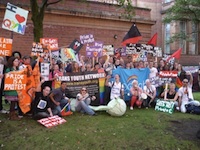Picnic to reclaim Pride from profiteers
Article published: Friday, August 27th 2010
Just minutes from the metal barriers of the Manchester Pride march, lesbian, gay, bisexual, trans and queer (LBGT/Q) activists will be offering a free and radical alternative this weekend writes Sian Bradley.
Reclaim the Scene’s (Out of the) Village Fête – with free food, live music and speakers – is being organised against a backdrop of increasing commercialisation and de-politicisation of Pride marches. The organisers aim to reinvigorate the politics of Pride, creating an inclusive event, catering for everyone regardless of gender, physical ability, age, orientation and, most importantly, the size of their pay-packet.
Since Manchester’s first Mardi Gras in 1990, the city’s August bank holiday Pride events have always had charity fundraising at their heart. The annual celebrations raised impressive amounts of cash for HIV/AIDS and LGBT groups while remaining free for over a decade. But as Pride celebrates its 20th anniversary this year, many are now left excluded by closed-off streets, ticketed entry and high prices.
“Manchester Pride excludes lots of LGBT people who simply cannot afford to go,” says Jennie O’Hara of Reclaim the Scene. “In effect, it makes some people too poor to be gay.”
Lacking Charity
The introduction of an entry fee in 1999 coincided with the only year the event raised zero money for charity, leaving some groups in financial turmoil. While Pride’s fundraising credentials have improved there are still concerns over how the wristband money is spent.
In 2007 only 12 per cent of proceeds went to charity, leading some to call Pride’s charitable status into question. A large proportion of what is raised is used to pay for the event itself, but according to g7uk.com’s Manchester Pride Investigation, the figures released by Pride are consistently unclear.
Furthermore the money raised by Pride pales in comparison to the benefit to businesses, who made £17 million even in recession-hit 2009, while just £135,000 went to good causes.
Less than one per cent of 2007’s charity money went to organisations other than the Lesbian and Gay Foundation and the George House Trust. Similar figures for other years have meant that smaller, community-based organisations are continually left out. Indeed, even as far back as 1999, a spokesperson for campaigning group OutRage! said: “[Most] of the weekend was largely directed at young drinkers and clubbers… So nowhere did we actually see the whole LGBT community out in all its diversity.”
Critics of this creeping commercialisation are not confined to the margins. Distaste was voiced at the top in 2008 when Village Business Association Chair Phil Burke resigned, saying that the event had “betrayed its roots” and had become “just about making money.”
High Costs
A prime example of this pattern of putting profit before people is seen in the £50 charge to groups wishing to partake in the parade. This entry fee hits small groups hardest. O’Hara believes this reveals a lack of inclusivity in stark contrast to the movement’s founding principles, commenting that “Pride has very little politics and almost nothing for children.”
Reclaim the Scene’s event aims to combat this exclusivity. Organisers hope the event will embody three main aims: that Pride events should be free; that Pride and the ‘scene’ should be accessible, inclusive and welcoming to all LGBT/Q people; and that rights need to be at the top of the agenda.
The day is set to include entertainment on stage, political and craft stalls, as well as activities for children such as games, workshops and face-painting. The location for the event – the former UMIST campus on Sackville Street which cuts through the ‘Village’ – was chosen so that both those with and without wristbands are free to attend.
History of Dissent
Reclaim the Scene is not the first group to pose a challenge to Manchester Pride. In 2007, Get Bent put on a series of alternative Pride events. Organised on a shoestring budget, it featured debates, poetry, films and club nights. Yet such opposition has not always been well-received. In 2008, when Queer Youth Network marched in the main Pride parade carrying “Pride not Profit” placards, organisers attempted to remove them but were resisted by the protesters.
This year the theme of the Pride parade is ‘through the decades.’ While the official website asks attendees to dust off their mullets while remembering LGBT heritage, activists fear that the focus on the past victories and struggles distracts from the fact that the battle is not yet won. Pride marches have the potential to be celebrations that unify LGBT and queer people in all their diversity, as well as being a powerful statement of strength and protest. To ignore this potential is a big mistake: for cutting the community in half will only serve to cripple its strength to drive change.
More: Culture
Comments
-
[…] space in the city for non-mainstream LGBTQ culture. Activist collective Reclaim the Scene has held alternative events in protest against what they see as an increasingly commercialised and exclusive Manchester Pride, […]
Pingback by » Iconic nightclub under threat - MULE on February 26, 2012 at 11:52 am -
[…] one of the most contested, with a fairly militant intervention by working-class queers in 2008, and a free alternative event organised in 2010. The struggles over the meaning of Pride got a bit of attention in 2010, although I’m not sure if […]
Pingback by Something to be proud of? A look at Pride’s journey from protest to profit-machine | Cautiously pessimistic on May 31, 2012 at 10:57 pm
The comments are closed.




